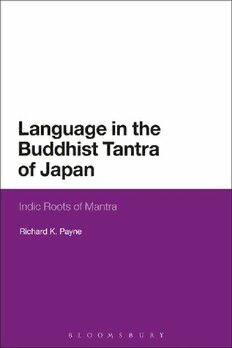
Language in the Buddhist Tantra of Japan: Indic Roots of Mantra PDF
254 Pages·2018·3.316 MB·
Most books are stored in the elastic cloud where traffic is expensive. For this reason, we have a limit on daily download.
Preview Language in the Buddhist Tantra of Japan: Indic Roots of Mantra
Description:
Language in the Buddhist Tantra of Japan dismantles the preconception that Buddhism is a religion of mystical silence, arguing that language is in fact central to the Buddhist tradition. By examining the use of “extraordinary language”—evocations calling on the power of the Buddha—in Japanese Buddhist Tantra, Richard K. Payne shows that such language was not simply cultural baggage carried by Buddhist practitioners from South to East Asia. Rather, such language was a key element in the propagation of new forms of belief and practice.In contrast to Western approaches to the philosophy of language, which are grounded in viewing language as a form of communication, this book argues that it is the Indian and East Asian philosophies of language that shed light on the use of language in meditative and ritual practices in Japan. It also illuminates why language was conceived as an effective means of progress on the path from delusion to “awakening”.
See more
The list of books you might like
Most books are stored in the elastic cloud where traffic is expensive. For this reason, we have a limit on daily download.
